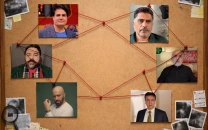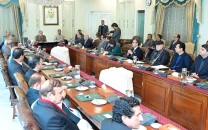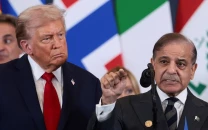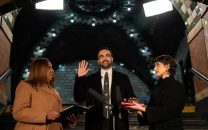Govt penalises defamation of institutions
Federal cabinet amends PECA; allows MPs to join election campaigns

The government on Saturday made changes in two laws that would pave the way for penalising defamation against the army, judiciary, public servants and government institutions as well as allowing the lawmakers and others to visit and address public gatherings during election campaigns.
An ordinance, criminalising defamation against the civil and military institutions, as well as public office-holders, is being promulgated on the heels of Prime Minister Imran Khan’s expression of dismay over malicious social media campaign, targeting him, ministers and other important personalities.
The move comes amid government’s attempt to curb spread of “fake news” and strengthening of the defamation laws. An official privy to the development told The Express Tribune that defamation cases would be decided within six months.
“[The] ordinance [will] be issued shortly,” the official said. “Defamation against army, judiciary or any public servant/govt institution has become a cognisable offence under PECA (Prevention of Electronic Crimes Act) Law with five-year imprisonment.”
The details about the proposed changes emerged after Federal Information Minister Fawad Chaudhry revealed that the federal cabinet had approved changes in two laws – the Election Act, 2017 and PECA of 2016.
Under the first law, Fawad said, parliamentarians would be allowed to take part in election campaigns, while under the second law, defaming people on social media had been made a cognisable offense. He added that courts would be required to decide defamation cases in six months.
Also read: PM Imran refutes ‘pathetic’ smear campaign targeting first lady
The critics, however, believed that the move was an attempt by the ruling party to not only control the digital space but also prevent criticism against the government and the country’s institutions.
“Amendment to PECA, through an ordinance approved by the federal cabinet, whereby criticising the judiciary or military is a punishable offence, is extremely regressive,” Usama Khilji, a digital rights activist, said.
“Institutions paid by taxpayers must be accountable to the people; but state keeps becoming more autocratic,” Khilji tweeted, adding that it was “unacceptable”.
According to a summary sent by the information technology ministry pertaining to incorporation of the amendments in PECA, it was stated that the Constitution guaranteed equality of citizens and equal protection of the law as fundamental rights under Article 25(1).
However, the summary added: “We are witnessing a fast-changing situation where electronic and digital media is playing an ever-increasing role in influencing public opinion and social behaviour.”
In view of the evolving circumstances, it maintained, the Law Division drafted certain amendments to PECA 2016, which had to be enacted through an ordinance as parliament was currently not in session.
“The prime minister has been pleased to allow to place this summary before the members of the federal cabinet through circulation,” it read.
Simultaneously, according to cabinet documents, the cabinet had proposed amendment to the electoral code of conduct by inserting Section 181-A in the Election Act of 2017, which would lift the bar on the lawmakers from visiting and addressing public gatherings during election campaigns.
The new section – 181-A – stated: “Notwithstanding anything to the contrary under this Act, rule or code of conduct or any other law, a member of Parliament (Majlis-e-Shoora), provincial assembly or elected member of Local Government, including member holding any other office under the Constitution or any other law shall, subject to sections 170 clause (a) sub clause (v), 175 (h), sub section (1) of sections 180, 181 and 182, may visit or address public meetings in any area or constituency during election campaign.” It added that the “act would have overriding effect”.
The amendment has been introduced days after the Election Commission of Pakistan (ECP) disqualified Umar Amin Gandapur, the brother of Federal Minister Ali Amin Gandapur, from contesting local bodies’ elections over repeated violations of the election code of conduct.
The documents stated that the ECP framed the code of conduct for political parties, contesting candidates and polling agents in terms of Section 233 of the Elections Act that imposed a number of restrictions on elected representatives and public functionaries’ participation in election campaigns.
Restrictions on elected representatives/public functionaries’ participation in election campaign warranted a review for various reasons and justifications, the documents said, adding that ample opportunities should instantly be given to the parties for projection of their manifestoes in the interest of general public in the ongoing election campaigns for local governments throughout the country.
While arguing in favour of running election campaigns, the documents said that Article 19 of the Constitution provided for fundamental right of freedom of speech and expression and it did not place restrictions relating to elections.
“It is imperative that all the contestant parties should be given a level-playing field in election campaigns,” a document said, adding that Article 25 of the Constitution provided equal opportunities to all.
In addition, it was further argued that Article 19-A provided the right to information and the people had the right to get information from all the contestants about their manifestoes and programmes for their betterment.
Maintaining that election was a continuous process, the documents said, the local bodies’ elections were going on, therefore, it would be appropriate to provide equal opportunities to all, subject to reasonable restrictions already imposed by the Election Act 2017.
Also, the documents read, there were international best parliamentary practices that those in government were not barred from campaigning in elections as they should not be in a disadvantageous position for being in government. “Timely decision will ensure a level-playing field for all.
“Furthermore, there has been a persistent demand of elected representatives as well as an overwhelming number of voters that the elected representatives, including elected members of cabinet, should be able to hear and meet the voters and interact with them and present their plan and vision.”
In view of the overwhelming demand, given the mandate of the Constitution, judgments of the Supreme Court and given the urgency that the local government elections were being held in different provinces, “it is proposed that the Election Act, 2017 may be amended as under by inserting new section after Section 181 of the Act through promulgation of Ordinance, under Article 89 of the Constitution”.



















COMMENTS
Comments are moderated and generally will be posted if they are on-topic and not abusive.
For more information, please see our Comments FAQ